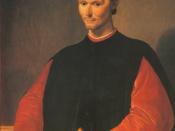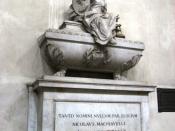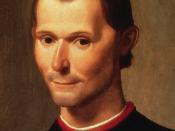Machiavelli has long been "an object of hatred to moralists of all persuasions, conservatives and revolutionaries alike" for his "cunning, duplicity, and the exercise of bad faith in political affairs" . Yet, he remains one of the most important Philosophers of all time for his views on leadership and political power. Inadvertently, there lies something of value within his texts that is inherently constructive as opposed to his morally degraded thoughts. Within his book "The Prince", lie numerous complex issues which Machiavelli tries to address. One of these issues is his politically dangerous criticism of the Church and its fundamentals. However, this issue isn't explicitly laid out for his fear of persecution by the Church. With references to Chapter 10, Chapter 20 and the chapters around them, I shall attempt to put on Machiavelli's shoes and give reason to his actions.
To get a fuller picture we must first consider whether Machiavelli was worthy of making such comments.
He was born in Florence in 1469 and was first involved in administrative affairs in 1498 at the age of 29. Like his fellow Florentines, he was influenced in the concept of studia humanitatis , which encompassed the mastery of Latin, the practice of rhetoric, the imitation of the finest classical stylists and a deep knowledge of moral philosophy and ancient history. These disciplines, as Cicero stressed, "nurture the values we principally need to acquire in order to serve out country well: a willingness to subordinate our private interests to the public good; a desire to fight against corruption and tyranny; and an ambition to reach out for the noblest goals of all, those of honor and glory for our country as well as for ourselves." There is an apparent problem with the last value and Machiavelli exploits this to his advantage...


